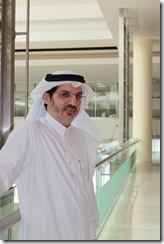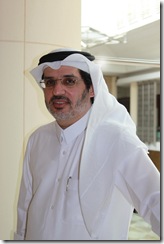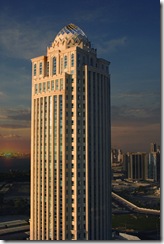In the past three years Qtel Group has matured into a pre-eminent operator having initially been considered one of the losers of the rapid M&A activity that had erupted in the Gulf a few years earlier. Speaking to Comm., Nasser Marafih, Qtel Group’s CEO talks of domestic competition prudent investment considerations and why sub-Sahara Africa is of little interest to the operator
Marafih says things have pretty much been as the telco expected with respect to the offers that Vodafone has come to market with
A research report issued by investment bank J.P. Morgan in October initiating its coverage of the MENA telecom sector rated Qtel stock as one of its top picks in its CEEMA region telecom universe; a result of the operator’s >50 per cent prospective upside in its stock price given its presence in a diverse number of markets from which the operator derives 75 per cent of its annual revenue.
This is a remarkable change in fortune for a Gulf operator that took its first tentative steps outside its borders in 2004, by winning the second mobile licence in Oman and the launch of Nawras. Nasser Marafih, Qtel Group’s CEO describes this investment as the signal of intent for Qtel, not just because it was the first of the company’s foreign forays, but because it began the learning process for the operator to become accustomed to operating in competitive markets in which it was not the only or leading telecom provider.
“The investment in Nawras gave us experience on how to operate as a competitor,” Marafih tells Comm. “This was an opportunity that helped us to prepare for competition in our domestic market, as well as to understand the different skills required in being a competitor in a market where there is already an established player.”
Nawras has been a runaway success, and prior to the introduction of mobile resellers in the country in April this year, had garnered a market share of close to 50 per cent.
In Qatar, Marafih says Qtel began preparing for the inevitable introduction of competition as early as 2001, when an intensive two-year programme commenced to streamline the telco and make it a much more customer-aligned organisation. The programme also identified two key areas: the defence of Qtel’s position domestically; and the expansion of operations outside of the country.
“Ibelieve the business we had established in Qtel was going to be able to meet any competition to the market,” Marafih says. “We had captured 120 per cent of the mobile market before the new entrant entered, and we were further motivated when we found out that it was Vodafone that was going to become our competitor because of its experience around the world.”
Having launched commercially in July, in the middle of September Vodafone Qatar reported it had added 100,000 subscribers to its network, with approximately 50 per cent of these users having opened a Freedom account – Vodafone’s post pay-equivalent product. The remaining 50 per cent had joined Red – Vodafone’s prepay tariff, which was launched earlier in September.
Vodafone’s subscriber base is estimated to have since risen to around 250,000 and while it is likely that the majority of Vodafone subscribers still own and use a Qtel SIM, the nascent operator’s presence is a threat worth taking seriously.
“Things have pretty much been as we expected,” says Marafih, referring to the offers that Vodafone has come to market with. “One of our biggest competitive advantages is the portfolio of products we have. We have been drawing closer to the customer and now provide a portfolio of services that the competitor does not have yet.”
Marafih estimates that it shall take some time for Vodafone to duplicate the types of services Qtel already has in the market and draws confidence from markets such as Japan and the US, where incumbent operators in those markets held their ground despite the entrance of formidable Vodafone.
Like many other operators in the Gulf, Qtel is looking to develop its data services as much as possible, and this extends across both the fixed line as well as the mobile network. The small geography of Qatar allows the country to be one of the few in the wider Middle East region, and around the world for that matter, to be able to claim 100 per cent coverage of broadband, with over 50 per cent of the country’s households utilising broadband today.
The origination and proliferation of content in the Arabic World remains an ongoing challenge in Marafih’s opinion, and he believes the private sector needs to take a position on the matter, aided by government encouragement. For its part, Qtel has been working with the Qatar Science and Technology Park in the way of investing in supporting the park’s initiatives. 
Marafih says markets such as Morocco would make sense for Qtel to enter, and he says the telco continues to look out for opportunities in Asia
The year 2007 marked the emergence of Qtel onto the international stage. In January of that year the telco extended its international presence after acquiring an approximate 25 per cent equity stake in ST Telemedia’s Asia Mobile Holdings (AMH), offering it access to the Singapore and Indonesia telecom markets.
This deal was significant not only because Qtel became the first Gulf operator to venture so far away from its domestic patch, but also because at a time when telecom asset valuations were sky high, Marafih and his team acquired the stake in AMH for a bargain price. At the time of the acquisition, the cash price paid for Qtel’s 25 per cent stake in AMH translated to 16 per cent below market prices, a virtually unheard of case for that premium priced period in time.
Thus Qtel’s acquisition translated to a cost per AMH subscriber of US$153 at a time when the Middle East’s average price paid per subscriber stood at around US$800.
“As far as possible we like to take control of assets,” Marafih says. We are in a strong position in the markets in which we operate and this is an important factor at a time of market maturity.”
In March 2007, Qtel announced the surprise acquisition of a 51 per cent stake in Kuwait based National Mobile Telecommunications Company (Wataniya) from Kuwait Projects Company for a total cash consideration of US$3.8 billion.
This deal gave Qtel credentials as an operator of note in its immediate vicinity, with Wataniya’s footprint of operations including Algeria, Kuwait and Saudi Arabia amongst others.
In June 2008 Qtel completed its acquisition of Indonesia Communications Limited (“ICLM”) and Indonesia Communications (“ICLS”), which held a combined 40.8 per cent interest in Indosat for US$1.8 billion in cash. With that transaction, Qtel increased its strategic stake in Indosat and raised its customer base to nearly 44 million in 16 countries.
“If you look at the people managing our international operations, we have changed every CEO after we acquired the business,” Marafih reveals. This is because we believe in top talent running the companies in which we invest and our presence in each of the markets in which we operate has strengthened the overall market.”
In a bid to ensure the burgeoning international empire remained true to the Qtel’s group 2020 vision to become a top-20 global telco by the year 2020, in February 2008 Qtel formed a discrete business division known as Qtel International to provide management services across the Qtel Group. Based in Doha, Qtel International plays a key role in realising Qtel’s overall ambitions, providing leadership and corporate governance for the group and performing key headquarter functions that can be conducted centrally, such as strategy development, financial reporting, treasury, and mergers and acquisitions.
The gains Qtel has made internationally have been impressive. The telco has doubled the number of subscribers in its operation in Iraq over the past two years, as it has done in Algeria. Qtel’s operation in Tunisia now holds the number one position in that market and in Oman Nawras’ subscriber base accounts for nearly half of all subscribers in the market.
“We focussed on the MENA region first, but as we saw the escalation of prices we decided to move our focus to another region,” explains Marafih. “We decided not to invest in sub-Sahara Africa like other operators from this region because our risk/return analysis showed that Asia was better for us. Sub-Sahara Africa is becoming a crowded market.”
Based in Doha, Qtel International plays a key role in realising Qtel’s overall ambitions, providing leadership and corporate governance for the group and performing key headquarter functions that can be conducted centrally
Looking ahead Marafih believes Qtel is in a good position to take advantage of investment opportunities that exist in the aftermath of the global economic downturn. Markets such as Morocco would make sense for Qtel to enter, and Marafih says the telco continues to look out for opportunities in Asia.
Qtel also continues to review the merits of a branding exercise and whether or not any real benefits would be driven by a re-branding exercise that would bring its majority-owned assets under a single identity.
“Branding is an issue that needs to be addressed,” acknowledges Marafih, “and one option would be the consideration of a single brand. We are analysing our position on this matter and will take steps at the right time.”
Looking ahead, Marafih says the telco already has good assets and is looking to strengthen the position of its operations while at the same time keeping an eye on any suitable investment opportunities that may arise.
“It is important to focus on content and to build relationships with content providers. It is important to be a group operator that takes advantage of its size and scale, and it is important to be patient,” Marafih says.





0 comments ↓
There are no comments yet...Kick things off by filling out the form below.
Leave a Comment